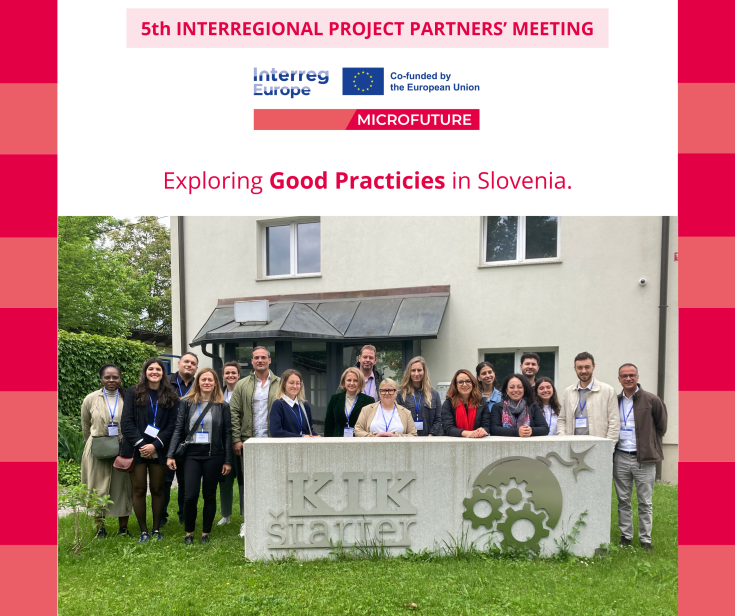MICROFUTURE PARTNERS GATHER IN SLOVENIA FOR THE 5th MEETING
On 21st May 2025, project partners of MICROFUTURE gathered in Kamnik, Slovenia, for the 5th interregional event focused on advancing sustainable microfinance and social inclusion through close cooperation between partners, public authorities and stakeholders, mostly social entreprises.
The event was organized by Development Centre of the Heart of Slovenia at Cooperative Kikštarter, where participants were welcomed and introduced to Kikštarter’s inspiring business support model, presented by Nika Škrjanec. The morning session was dedicated to a meeting focusing on project planning for the last year of the core phase, as well as a discussion on policy improvements necessary to supportmicrofinance initiatives for vulnerable target groups effectively. Partners also engaged in the MICROFUTURE “Improvement Game,” designed to test project partners’ knowledge of the project and demonstrate achievements inspired by good practices in microfinance in social economy. Following this, representative from Ministry of Economy, Tourism and Sport, Petra Kovačec, presented current calls for social enterprises and updates on social entrepreneurship legislation in Slovenia, providing valuable insight into the national framework supporting the sector. An interesting discussions arose presenting the differences in social entreprise regulations of each partners country.
The afternoon was dedicated to presentations of the policy improvement checklist by all partners, showcasing results and recommendations for further policy development. The day concluded with an online session held by the Yunus Foundation, our advisory partner, which presented SROI, that stand for Social Return on Investment, a new approach that quantifies the value of social, environmental, and economic outcomes generated by social organizations. By assigning monetary values to these outcomes, SROI provides a comprehensive view of the impact created per unit of investment, enabling stakeholders to assess the effectiveness and efficiency of their activities in delivering tangible societal benefits.
EXPLORING SOCIAL ENTERPRISES IN SLOVENIA
On 22nd May we visited the social enterprise Association KNOF in Krško, presented by leader Mojca Žganec Metelko. Association operates a boutique selling second-hand clothes, a salon with refurbished furniture and a circular lab focused on developing sustainable innovations, like sound proof upcycled walls. KNOF exemplifies social entrepreneurship with significant social and environmental impact. Also a short workshop was introduced to partners and stakeholders through the Simple Business Model Canvas, a tool designed to quickly address challenges through social entrepreneurship approaches. Thorugh the activity we have managed to put ourselves in different roles, to understand the issues of all involved groups in the business negotiations.
Following this, we visited the Association ETRI group in Ljubljana, whose principle is »fostering an inclusive society through employment opportunities for all«. 5 social enterprises were presented: Association Allium, Pod strehco, SOTETOS Luče, Zelena pot and Lintvern. Alenka Puh, the founder of the ETRI group and her team presented all 5 social enterprises. Association Allium is focused on sustainable agriculture, connecting local farmers with consumers to promote eco-friendly practices. Pod strehco fosters social inclusion by employing vulnerable groups through hospitality services and community events and they also prepared an amazing lunch for us. SOTETOS Luče is dedicated to sustainable development and creating job opportunities for marginalized individuals through environmentally friendly initiatives. Zelena pot promotes environmental awareness and sustainable resource use by engaging vulnerable groups in nature conservation projects. Lintvern specializes in innovative recycling solutions and circular economy practices while integrating socially disadvantaged people into sustainable work.
The event inspired participants (partners and stakeholders), equipping them with the knowledge and ideas to advance microfinance policies and practices in their regions.

